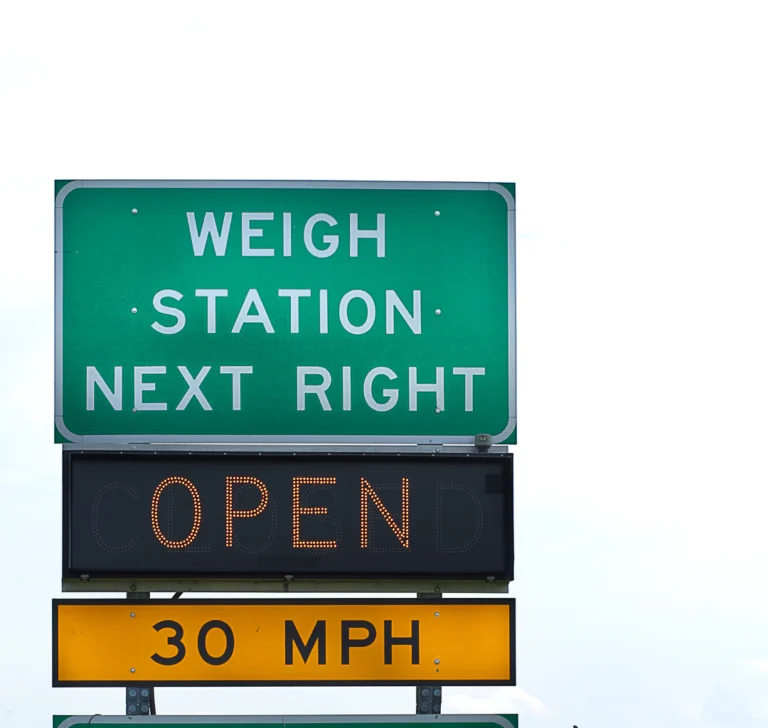The Weigh Station Enforcement to Intercept and Guard Highways Act (WEIGH) would turn all weigh stations on interstate highways into English proficiency checkpoints.
In recent months, the trucking industry has seen an increase in regulations related to migrant drivers, aimed at strengthening overall sector safety. In this context, a new piece of legislation has been introduced to tighten language requirements for truck drivers.
Introduced on Monday, September 8, the Weigh Station Enforcement to Intercept and Guard Highways Act (WEIGH) would turn all weigh stations on interstate highways into English proficiency checkpoints.
The new law, proposed by Republican Congressman Byron Donalds of Florida, would require all weigh stations along the interstate system to inspect commercial driver’s licenses (CDLs) for potential irregularities. At the same time, these stations would serve as checkpoints to assess truck drivers’ proficiency in English, according to a statement released by Donalds.

Weigh Station Enforcement to Intercept and Guard Highways Act (WEIGH)
These measures come in response to recent accidents caused by truck drivers who either lacked valid commercial licenses, did not speak English, or were involved in the growing trend of CDL fraud observed in recent years.
Florida—the state where the crash involving driver Singh took place—has been among the most proactive in addressing the issue. Last week, Senator Ashley Moody introduced a bill in the Senate that would require CDLs to be issued only to U.S. citizens, lawful permanent residents, or individuals with a valid work visa or authorization from U.S. Citizenship and Immigration Services. The bill would also prohibit the issuance of temporary or non-domiciled CDLs altogether. Furthermore, it would mandate that all states regularly report to the federal government on their efforts to enforce English language requirements.
The latest legislative effort to tackle this growing “crisis” in road transportation is Congressman Donalds’ WEIGH Act. If passed, it would codify and enforce the Executive Order on English Language Proficiency (ELP) at all interstate weigh stations, empowering the U.S. Department of Transportation to use these facilities to uphold the order initially issued by President Trump.
“States’ failure to enforce these basic, common-sense requirements for truck drivers is putting every American motorist at risk. Safety must be the standard, not the exception,” stated Donalds in his release.

Desperate times call for desperate measures
Donalds emphasized that every truck driver passing through an interstate weigh station should be prepared for both a cargo inspection and an English language proficiency evaluation.
He also warned that states failing to properly implement the control protocols established by the Secretary of Transportation could face serious consequences, including the loss of their authority over the CDL program and the suspension of federal highway funding.

Lunar New Year 2026: Ancient Traditions, Renewed Energy, and Massive Celebrations
Lunar New Year 2026 begins on February 17 under the sign of the Fire Horse and is marked by spiritual rituals, family reunions, and large-scale celebrations in both China and the United States, especially in California.

Freedom 250 Grand Prix: How Logistics and Transportation Will Power the Race in Washington
The first-ever IndyCar street race in Washington, D.C., scheduled for August 21–23, will headline the United States’ 250th anniversary celebrations — and it will trigger a massive transportation, freight, and urban logistics operation behind the scenes.

Groundhog Day: What It Means for Trucking When “Phil Sees His Shadow”
The forecast from America’s most famous groundhog is calling for more winter — and that’s an important signal for the trucking industry and cold-season route planning

Love on the open road: the best dating apps for truckers
If you’re looking for someone to go the long haul with, here are the best dating apps for truck drivers. They say love is everywhere…

The most congested cities in the U.S. and the world in 2025
The annual TomTom Traffic Index produces a ranking of the most congested cities in the world. The annual TomTom Traffic Index presents an analysis of

Steady Growth Signals Strong Momentum in the U.S. Trucking Industry
Trucking growth in the United States is gaining strength in 2026, driven by higher freight demand, expanding logistics activity, and new opportunities for carriers and fleet operators.
